| 中文名稱 | 軸抑制蛋白2抗體 |
| 別 名 | Axil; Axin like protein; Axin-2; Axin-like protein; Axin2; Axis inhibition protein 2; AXIN2_HUMAN; Conductin. |
| 研究領域 | 腫瘤 細胞生物 免疫學 神經生物學 信號轉導 干細胞 細胞周期蛋白 轉錄調節(jié)因子 |
| 抗體來源 | Rabbit |
| 克隆類型 | Polyclonal |
| 交叉反應 | Mouse, Rat, (predicted: Human, Dog, Horse, ) |
| 產品應用 | WB=1:500-2000 ELISA=1:500-1000 IHC-P=1:100-500 IHC-F=1:100-500 IF=1:100-500 (石蠟切片需做抗原修復) not yet tested in other applications. optimal dilutions/concentrations should be determined by the end user. |
| 分 子 量 | 93kDa |
| 細胞定位 | 細胞漿 |
| 性 狀 | Liquid |
| 濃 度 | 1mg/ml |
| 免 疫 原 | KLH conjugated synthetic peptide derived from human Axin 2 corresponding:331-430/843 |
| 亞 型 | IgG |
| 純化方法 | affinity purified by Protein A |
| 儲 存 液 | 0.01M TBS(pH7.4) with 1% BSA, 0.03% Proclin300 and 50% Glycerol. |
| 保存條件 | Shipped at 4℃. Store at -20 °C for one year. Avoid repeated freeze/thaw cycles. |
| PubMed | PubMed |
| 產品介紹 | Inhibitor of the Wnt signaling pathway. Down-regulates beta-catenin. Probably facilitate the phosphorylation of beta-catenin and APC by GSK3B. Involvement in disease:Defects in AXIN2 are involved in colorectal cancer (CRC). They appear to be specifically associated with defective mismatch repair. Defects in AXIN2 are the cause of oligodontia-colorectal cancer syndrome (ODCRCS). Affected individuals manifest severe tooth agenesis and colorectal cancer or precancerous lesions of variable types. Function: Inhibitor of the Wnt signaling pathway. Down-regulates beta-catenin. Probably facilitate the phosphorylation of beta-catenin and APC by GSK3B (By similarity). Subunit: Interacts with glycogen synthase kinase-3 beta (GSK3B) and beta-catenin. The interaction between axin and beta-catenin occurs via the armadillo repeats contained in beta-catenin (By similarity). Interacts with SMAD7 and RNF111. Interacts with ANKRD6. Subcellular Location: Cytoplasm. Tissue Specificity: Expressed in brain and lymphoblast. Post-translational modifications: Probably phosphorylated by GSK3B and dephosphorylated by PP2A (By similarity). ADP-ribosylated by tankyrase TNKS and TNKS2. Poly-ADP-ribosylated protein is recognized by RNF146, followed by ubiquitination and subsequent activation of the Wnt signaling pathway. Ubiquitinated by RNF146 when poly-ADP-ribosylated, leading to its degradation and subsequent activation of the Wnt signaling pathway. Deubiquitinated by USP34, deubiquitinated downstream of beta-catenin stabilization step: deubiquitination is important Wnt signaling to positively regulate beta-catenin (CTNBB1)-mediated transcription. DISEASE: Defects in AXIN2 are involved in colorectal cancer (CRC) [MIM:114500]. They appear to be specifically associated with defective mismatch repair. Defects in AXIN2 are the cause of oligodontia-colorectal cancer syndrome (ODCRCS) [MIM:608615]. Affected individuals manifest severe tooth agenesis and colorectal cancer or precancerous lesions of variable types. Similarity: Contains 1 DIX domain. Contains 1 RGS domain. SWISS: Q9Y2T1 Gene ID: 8313 Database links: Entrez Gene: 8313 Human Entrez Gene: 12006 Mouse Entrez Gene: 29134 Rat Omim: 604025 Human SwissProt: Q9Y2T1 Human SwissProt: O88566 Mouse SwissProt: O70240 Rat Unigene: 156527 Human Unigene: 71710 Mouse Unigene: 162212 Rat Important Note: This product as supplied is intended for research use only, not for use in human, therapeutic or diagnostic applications. |
| 產品圖片 | 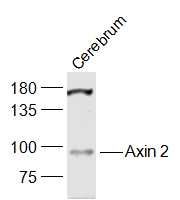 Sample: Sample:Cerebrum (Mouse) Lysate at 40 ug Primary: Anti-Axin 2 (bs-5717R) at 1/1000 dilution Secondary: IRDye800CW Goat Anti-Rabbit IgG at 1/20000 dilution Predicted band size: 93 kD Observed band size: 93 kD 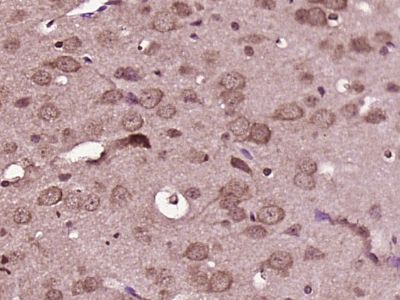 Paraformaldehyde-fixed, paraffin embedded (Mouse brain); Antigen retrieval by boiling in sodium citrate buffer (pH6.0) for 15min; Block endogenous peroxidase by 3% hydrogen peroxide for 20 minutes; Blocking buffer (normal goat serum) at 37°C for 30min; Antibody incubation with (Axin 2) Polyclonal Antibody, Unconjugated (bs-5717R) at 1:400 overnight at 4°C, followed by a conjugated secondary antibody (sp-0023) for 20 minutes and DAB staining. Paraformaldehyde-fixed, paraffin embedded (Mouse brain); Antigen retrieval by boiling in sodium citrate buffer (pH6.0) for 15min; Block endogenous peroxidase by 3% hydrogen peroxide for 20 minutes; Blocking buffer (normal goat serum) at 37°C for 30min; Antibody incubation with (Axin 2) Polyclonal Antibody, Unconjugated (bs-5717R) at 1:400 overnight at 4°C, followed by a conjugated secondary antibody (sp-0023) for 20 minutes and DAB staining.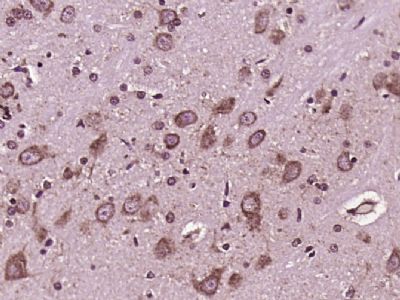 Paraformaldehyde-fixed, paraffin embedded (Rat brain); Antigen retrieval by boiling in sodium citrate buffer (pH6.0) for 15min; Block endogenous peroxidase by 3% hydrogen peroxide for 20 minutes; Blocking buffer (normal goat serum) at 37°C for 30min; Antibody incubation with (Axin 2) Polyclonal Antibody, Unconjugated (bs-5717R) at 1:400 overnight at 4°C, followed by a conjugated secondary antibody (sp-0023) for 20 minutes and DAB staining. Paraformaldehyde-fixed, paraffin embedded (Rat brain); Antigen retrieval by boiling in sodium citrate buffer (pH6.0) for 15min; Block endogenous peroxidase by 3% hydrogen peroxide for 20 minutes; Blocking buffer (normal goat serum) at 37°C for 30min; Antibody incubation with (Axin 2) Polyclonal Antibody, Unconjugated (bs-5717R) at 1:400 overnight at 4°C, followed by a conjugated secondary antibody (sp-0023) for 20 minutes and DAB staining.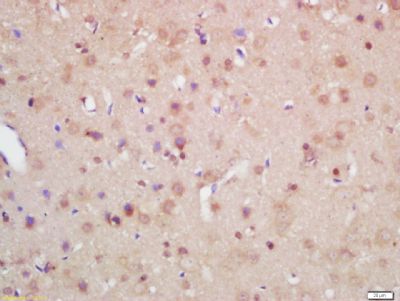 Tissue/cell: rat brain tissue; 4% Paraformaldehyde-fixed and paraffin-embedded; Tissue/cell: rat brain tissue; 4% Paraformaldehyde-fixed and paraffin-embedded;Antigen retrieval: citrate buffer ( 0.01M, pH 6.0 ), Boiling bathing for 15min; Block endogenous peroxidase by 3% Hydrogen peroxide for 30min; Blocking buffer (normal goat serum,C-0005) at 37℃ for 20 min; Incubation: Anti-Axin 2 Polyclonal Antibody, Unconjugated(bs-5717R) 1:200, overnight at 4°C, followed by conjugation to the secondary antibody(SP-0023) and DAB(C-0010) staining 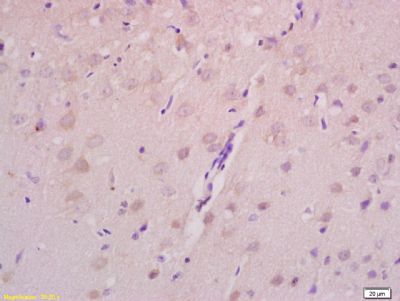 Tissue/cell: rat brain tissue; 4% Paraformaldehyde-fixed and paraffin-embedded; Tissue/cell: rat brain tissue; 4% Paraformaldehyde-fixed and paraffin-embedded;Antigen retrieval: citrate buffer ( 0.01M, pH 6.0 ), Boiling bathing for 15min; Block endogenous peroxidase by 3% Hydrogen peroxide for 30min; Blocking buffer (normal goat serum,C-0005) at 37℃ for 20 min; Incubation: Anti-Axin 2 Polyclonal Antibody, Unconjugated(bs-5717R) 1:200, overnight at 4°C, followed by conjugation to the secondary antibody(SP-0023) and DAB(C-0010) staining |
我要詢價
*聯(lián)系方式:
(可以是QQ、MSN、電子郵箱、電話等,您的聯(lián)系方式不會被公開)
*內容:









